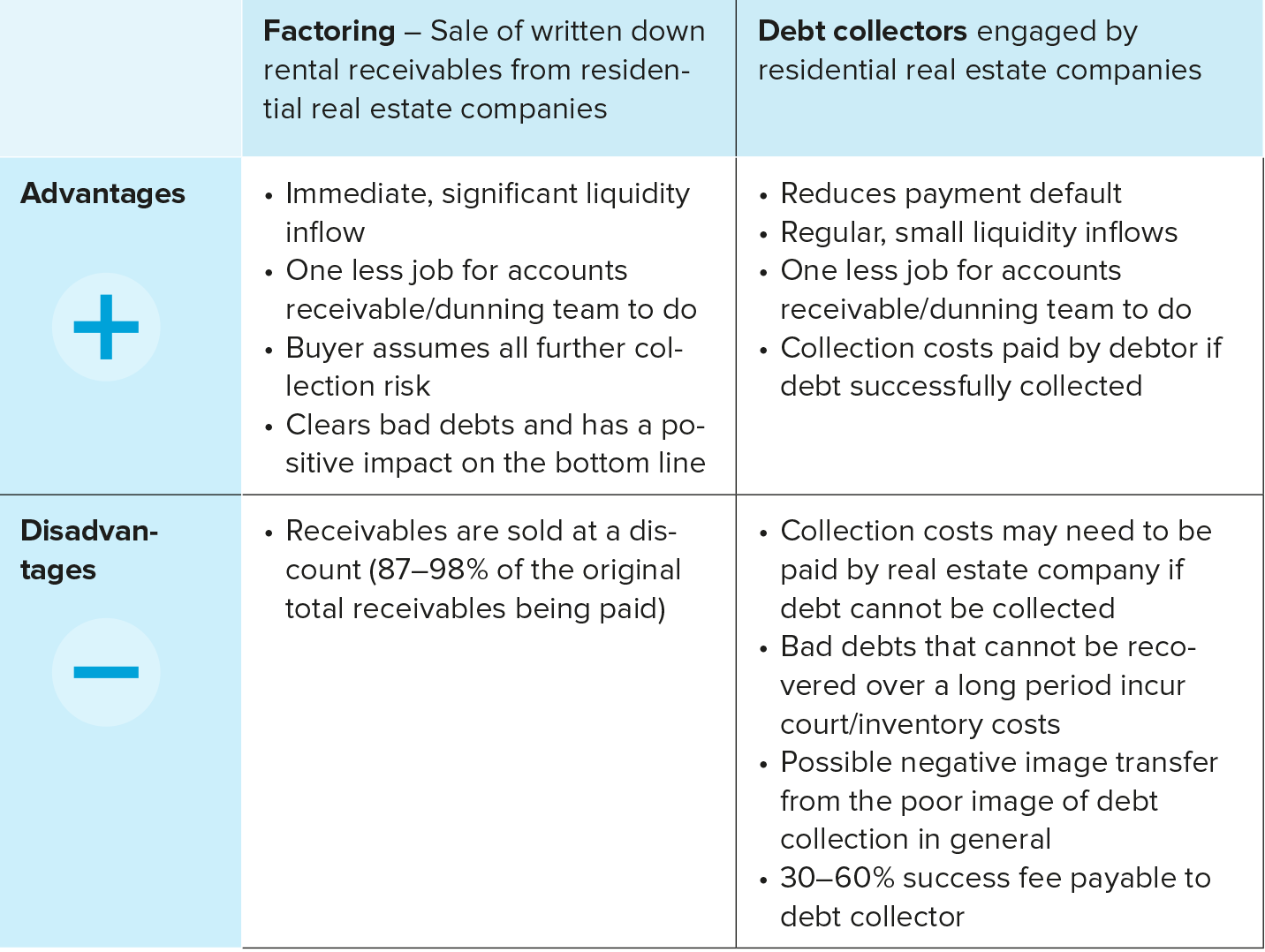Delinquent Tenant Receivables in the Residential Real Estate Sector Offer Frequently Overlooked Revenue Potential
Large real estate companies are always having to deal with tenants in arrears. Despite internal dunning and eviction procedures they still have to write down millions in unpaid rent and utility charges. But delinquent, written down receivables are not fundamentally worthless – in fact they offer long-term revenue potential in many cases. Once they are legally enforceable claims (i.e. have been declared as legitimate receivables in a court of law) the statutory limitation period extends to 30 years.
Residential real estate companies have various options they can take when deciding which strategic position to adopt on receivables management:
- No longer pursue delinquent receivables from debtors from whom payment could not be elicited even after legal proceedings (e.g. personal bankruptcy)
- Engage debt collectors to collect the receivables
- Make up “packages” of written down receivables and sell them off (factoring). This can be done on a rolling basis (e.g. all receivables falling due on a monthly or quarterly basis) or they can be put into one large package and sold to clear bad debts
The option of engaging a conventional debt collection agency cannot be recommended unreservedly from a business perspective for a residential real estate company. Total receivables from each (former) tenant usually amount to several thousand euros. Particularly when you have tenants who have been through dunning procedures, forced evictions and court cases, the tenants may be on the verge of personal bankruptcy in many cases. They may have moved away without leaving a forwarding address as a result, or they may only be able to pay off the debt in very small installments (e.g. 10 – 20 euros a month). The prospects of the total claim being paid back in the short to medium term is consequently very low. Not only that, but there is the distinct possibility of the real estate company suffering damage to its image as a result of being connected with debt collectors. Instead of pursuing the few promising cases internally or with a local collection agency for moderate success, factoring offers a better option.
Factoring as an alternative to debt collection
Factoring involves a company (continually) selling its receivables to a specialist service provider. Member companies of the German Factoring Association saw their combined revenues exceed 200bn EUR for the first time in 2015. Although it must be said that the vast majority of factoring revenues have nothing to do with delinquent receivables that have been through the dunning procedure.
Normally, the procedure in factoring is as follows: The company selling the receivables (e.g. a trading company, manufacturing firm or service provider) signs its receivables over to a factoring company as soon as the respective invoices have been raised. The factoring company then pays the seller 80 – 90% of the total receivables immediately and subsequently takes care of the incoming invoice payments itself – including accepting the risk that the debt may be defaulted on (collection risk).
So as we can see, regular factoring does not represent a compelling option for a residential real estate company – after all, it’s clear that landlords don’t need external help with monitoring their incoming rental payments. However, the factoring market is very diverse and some providers have specialized in the niche market of buying distressed receivables. And among them, certain expert firms are specifically targeting real estate and utility companies.

Figure 1: Comparison of factoring vs. debt collection from a residential real estate company’s perspective
Large packages of rental receivables are in high demand among factoring firms
Germany’s healthy economy means that payment practices are generally better than average here and the demand for receivables portfolios exceeds supply. The low interest rate environment means that many of the big factoring firms can refinance their debt at low cost and are willing to pay attractive prices to real estate companies selling off their receivables in auctions or tendering procedures.
Added value with RITTERWALD
RITTERWALD has very good knowledge of relevant market players and service companies and supported one of Germany’s leading municipal housing companies in selling their written down tenant receivables (15m EUR in total receivables from 5,200 debtors) in a structured bidding process. Of the 27 market players identified, 11 were contacted and competitive negotiations were entered into with 3 bidders. Ultimately, the receivables were successfully offered to the best bidder – a professional and reputable factoring company – without attracting any public attention. The attractive price paid for the portfolio of written down receivables improved our client’s bottom line in the form of a one-time effect.
Contact
Do you have questions regarding this topic? Please contact:
-
 Dr. Mathias Hain
Dr. Mathias Hain-
email hidden; JavaScript is required
-
email hidden; JavaScript is required
